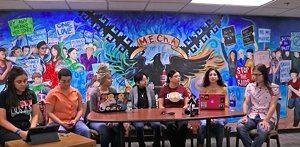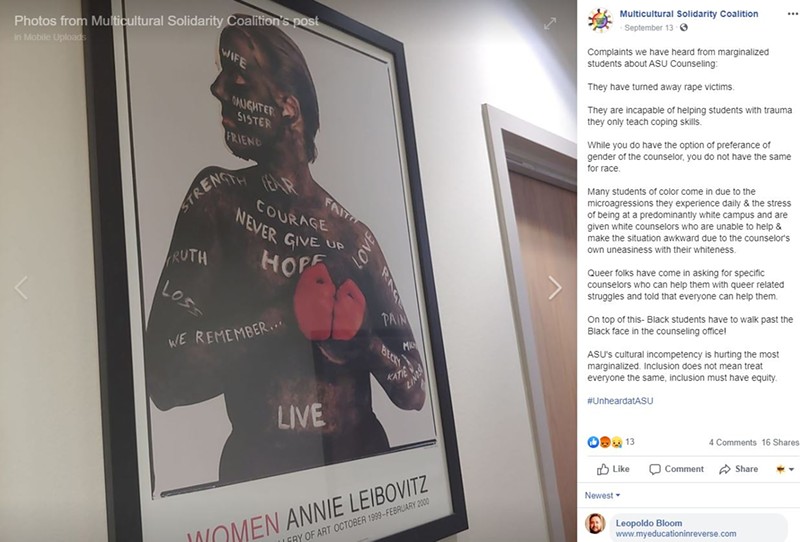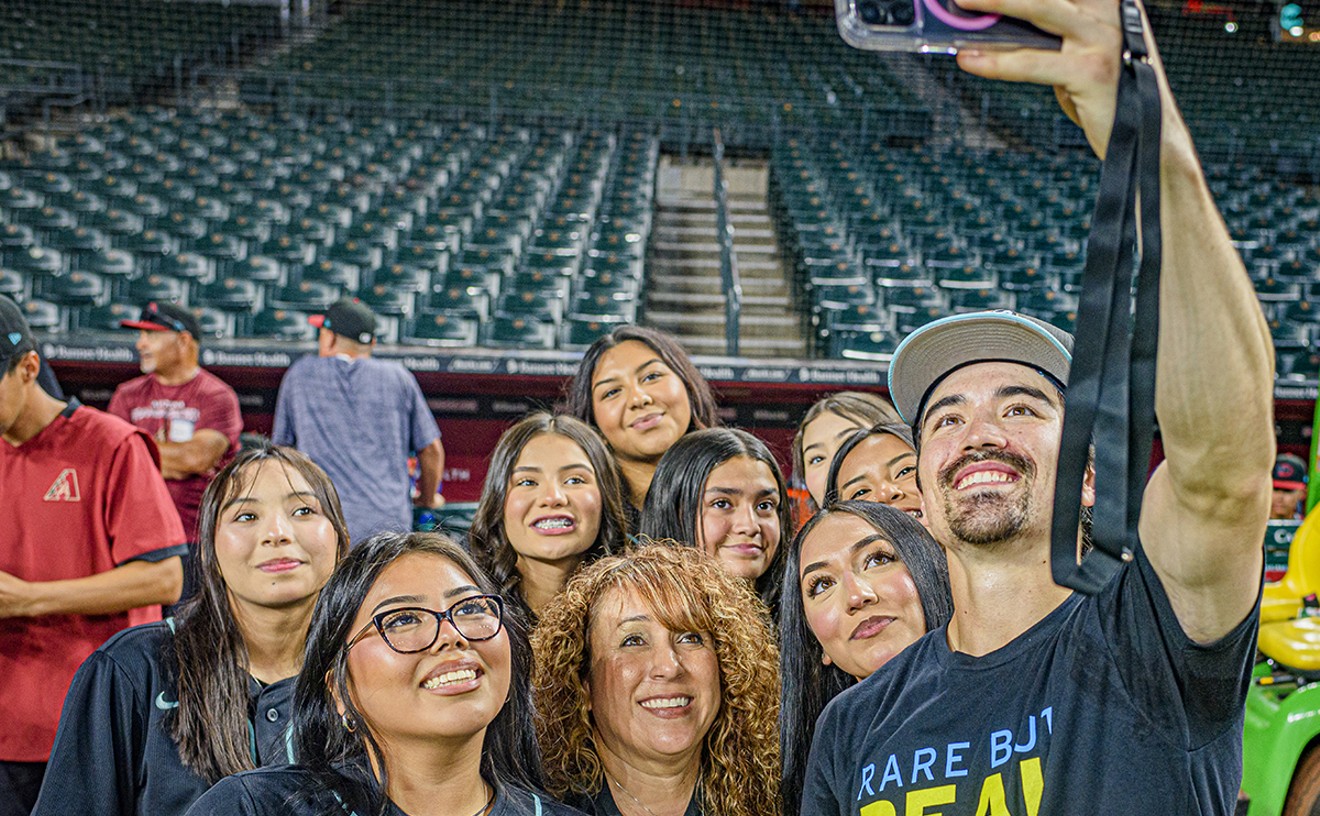The Multicultural Solidarity Coalition, an ASU student group, says yes, and reported last week that the university removed the "racist" photo after complaints.
The group made the allegation initially in a September 13 Facebook post that was widely shared. And the group repeated the allegation at a press conference at ASU on Friday, November 22, stating that the photo had been taken down.
Reporters from the Arizona Republic and ABC-15 News (KNXV-TV) who covered the event later produced articles about it. The group also posted videos on social media of the entire news conference, which covered a wide range of issues covered by the students, who focused on what they say is a culture of hostility and racism toward people of color, the LGBTQ community, and leftists on campus.
Zahara Teacola, president of ASU's Black Graduate Student Association and a representative of Black Lives Matter, spoke at length during the Friday event about the alleged blackface photo, which the group's September Facebook post shows was a print of a photo by famed photographer Annie Leibovitz from her "Women" collection. The photo depicts a white woman covered in a paste of dark-brown, with hands painted red and words written on her face and body such as "wife," "daughter," "courage," and "hope."
Leibovitz shot the "Women" series for a book published in 2000 with essays by Susan Sontag. She introduced a new crop of photos for the series in 2016 featuring powerful women including Hillary Clinton. While Leibovitz has created controversy over the years as an artist, the photo taken down at ASU doesn't seem to have generated criticism previously.
"We are disappointed that ASU counseling would remove the racist image without apologizing to black students,” Teacola is quoted as saying in the Republic article by BrieAnna J. Frank and Alyssa Stoney, who didn't describe the photo or mention it was from an Annie Leibovitz collection. ABC-15's article by Karla Navarrete also did not provide any context for the photo besides stating that Teacola alleged it showed "a white woman with blackface."
Blackface is typically defined, as it is in one online dictionary, as "dark makeup worn (as by a performer in a minstrel show) in a caricature of the appearance of a black person." Blackface worn by white people to appear "black" as a Halloween costume or for other reasons has been a sore point for many black people, especially considering the virulent racism of past minstrel shows. Sensitivity over the issue can be extreme: One Phoenix resident faced a backlash on social media after he claimed in a January op-ed in the Republic that a photograph of miners covered in coal ash hanging at a downtown Phoenix resident was an example of blackface.
Leibovitz declined comment on the ASU controversy over her photo.
"She traditionally never comments on these matters," said Jeffery Smith, USA executive director of Contact Press Images, a photojournalism agency that Leibovitz joined in 1977. "She ... leaves her images to stand on their own."
Teacola said at the press conference that 2,000 people shared its post about "blackface on the wall of the counseling services office."
"Rather than acknowledge or apologize for the harm the offensive photograph caused the black students, ASU quietly removed the image," Teacola said.

Zahara Teacola, (left), joined representatives of other ASU groups on November 22 to denounce the "hostile" environment for people of color, the LGBTQ community, and leftists on campus.
Screenshot from YouTube Video
Taking the Leibovitz photo down wasn't enough, Teacola said.
ASU needs to issue an official apology and acknowledgment that "students felt uncomfortable and bullied by a blackface photo," she said.
The Multicultural Solidarity Coalition additionally wants ASU to address an alleged lack of appropriate help by counselors for people of color. They want ASU to create a training program with the group's oversight "that promotes racial and cultural competency," and they want students to be able to choose counselors based on a specific race or background.
ASU released a statement to Phoenix New Times this morning about why it removed the photo.
"The print had context in a larger collection of images that were selected by a large, diverse group many years ago," the statement said. "We understand that some people could interpret the image differently and when concerns from students surfaced, we responded."
Asked on Sunday to describe why they felt the photo was racist and a blackface example, and if Leibovitz intended to be racist, in their view, the Coalition did not hold back:
"The fact that you are even investigating this is racist," the group said, without attributing the statement to any particular member. "Racism is not about what her intention was, racism is the impact to black students."
If black students said the art made them feel uncomfortable and unwelcome at the counseling center "of all places," then Leibovitz's intention in creating the photo didn't matter.
Then the group got personal: "You as a white person do not get to determine whether something is racist. If you want to investigate something investigate what a microaggression is because your whole article you are writing is one."
(UPDATE: The woman in the photo is Rebecca Denison, an Oakland, California, HIV/AIDS activist, and the founder of WORLD:Women Organized to Respond to Life-Threatening Diseases. New Times left a message for her but hasn't yet heard back.)
See below for the YouTube video the group made of its entire November 22 press conference:











